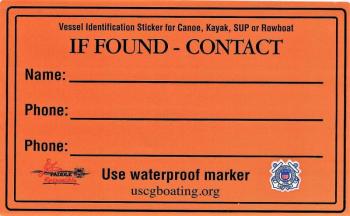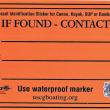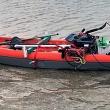Get and use those free “If Found” stickers
The U.S. Coast Guard is America’s other multi-mission maritime military service with a list of mandated mission areas not shared by the U.S. Navy. One of the Coast Guard’s highest profile missions is Search and Rescue, the news-making helicopter and vessel missions where survivors are pulled from dangerous seas or hoisted off the pitching decks of vessels in distress; scenes with which everyone is familiar.
A part of their Search and Rescue mission mandate, which is unfamiliar to most and much less dramatic, is the requirement that a vessel found adrift and unoccupied must be assumed to have left shore with someone on board. To better grasp the scope of that mission, understanding how a “vessel” is defined is important. A “vessel” generally refers to any conveyance capable of transporting people and/or goods on the water. If you let that sink in, no pun intended, the scope of a serious problem becomes clear.
“Paddle-sports,” the new generic designation for vessel activity involving canoes, kayaks and stand-up paddle boards, is the fastest growing segment of recreational boating activity. The news to many paddle-sports enthusiasts is that they’re boaters, just like the person on a 26-foot sailboat or a 100-foot yacht. As boaters they’re subject to federal and state regulations for equipment, safety and operational limitations. Life jackets, sound producing devices and day-only operations are the Big 3.
The other news to paddle-sports participants, along with owners of row boats and dinghies, is that any vessel found adrift and unoccupied is automatically a “Person in the Water” (PIW) Search and Rescue emergency for the Coast Guard. “Vessel Adrift/PIW” cases are missions on which the Coast Guard expends millions of taxpayer dollars each year performing often needless search operations.
Unlike larger vessels with registration or documentation information shown and traceable, paddle craft and many dinghy-type small craft have no markings at all. Hours may be spent searching for a nonexistent occupant who is often unaware that their kayak or dinghy has come loose from the dock or been lifted from the shore by a high tide and cast adrift.
Understanding the costs of operating various Coast Guard assets in a search for a missing, or non-missing, person brings the disturbing realization that an accidentally adrift kayak could easily consume tens of thousands of dollars while prosecuting just one unnecessary search mission. With costs per hour ranging from several thousand dollars for boats to over ten thousand dollars per hour for some Coast Guard helicopters and airplanes, discovering that your dinghy or kayak has drifted off is much more than an inconvenience for you.
Multiply those costs by all the hours expended conducting preventable searches nation-wide and it becomes clear that finding a solution to this problem is critical.
Fortunately, the Coast Guard and Coast Guard Auxiliary have a solution that’s simple, effective and free. “If Found” labels designed specifically for non-registered watercraft are available at marine related locations throughout the area as well as many post offices and town offices in CG Station Boothbay Harbor’s area of operations. The bright orange stickers have a water-resistant adhesive and are best filled in using a “laundry” marker or one of the new Super Sharpie type markers.
Fill in your name and your contact info along with contact info for someone ashore who may know your whereabouts in case you really are a “Person in the Water” for whom answering a cell phone call or text is not an option and for whom survival is your current primary focus.
There aren’t many things in life that are all upside and no downside, but the free “If Found” stickers are pretty close to that elusive combination because: you may help save millions of taxpayer dollars each year; you may get your paddle board, kayak or dinghy back if it goes missing; and you may help yourself get rescued if your unoccupied paddle-craft is located and you’re in the water somewhere possibly nearby.
Event Date
Address
United States




























